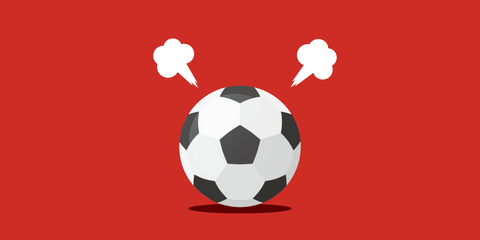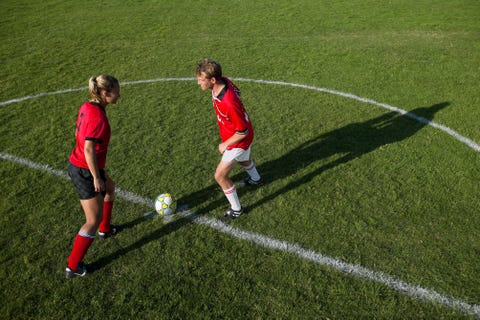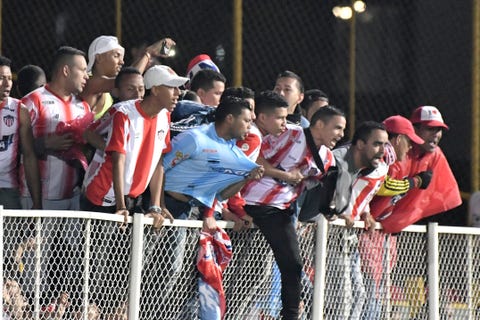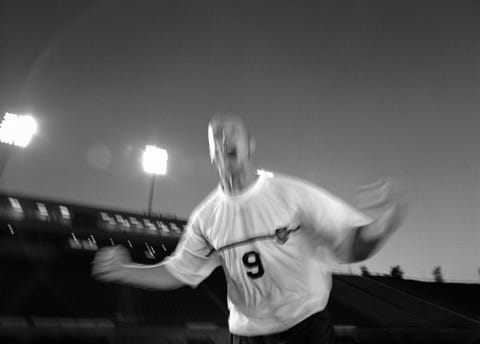Angry, Aggressive Men Ruin Rec Sports. Here's How to Stop Them.

It’s a scene all too common on recreational soccer fields across the country: Two men chest to chest, on the verge of blows, over a dispute during a meaningless game.
Displays like this might seem appropriate for pro matches with real financial stakes or a bad sports movie, but I’ve seen it time and again in real life over a rec soccer career spanning across several different organizations and states.
Adult recreational leagues might have the lowest stakes out of any level of organized sport, but that doesn’t prevent many players — overwhelmingly, men — from treating every contest like their lives are on the line.
Why Men Play Too Hard
I had my own theories about the source of aggression in rec soccer players, such as projecting career frustrations or relationship problems onto the pitch. I reached out to Dr. Mitch Abrams, a clinical sports psychologist, to find out if my suspicions are on target.
Abrams, who is also a chief psychologist in the New Jersey prison system, focuses on anger management, violence, and trauma. “Anger management in sport may be the greatest secret that everybody wonders about [but] nobody wants to talk about,” Dr. Abrams told MensHealth.com.

He believes one contributing factor to excessive on-field aggression, particularly in recreational sports, might be grasping onto one’s identity as an athlete. “There is almost a panic, a desperation that ‘I’m not going to lose this and I will demonstrate that I will not lose it with the fever-pitched craziness I approach this game with,’” he said.
Abrams also noted a crucial difference in recreational sports leagues compared to other levels of play: there’s typically no coach, or “adult” on the field. You can’t slide tackle your boss for sending a snarky email in your office — but you can totally deck your opponent on the pitch if no authority figure is holding you accountable to the rules. “What you can do in society is much, much more strict than what you can do in sport,” he said.
The “Macho” Problem
Overzealous players can ruin a rec-league experience for anyone, but the problem is particularly pointed when men and women share the field. A disturbing account of co-ed sports confirmed my worst fears and highlighted an even more troubling problem: The damaging effects unruly behavior from men can have on the women on these shared playing fields.
The story includes several accounts of women discouraged from playing or even injured by overly aggressive male players. These men, according to the anecdotal evidence, are ticking time bombs prone to violent explosions. These anecdotes also reveal a dirty secret about co-ed leagues: The organizations are open to everyone by rule, but they’re really men’s leagues. A certain number of women might be required to be on the field, which makes it seem like they’re a handicap. And, as the story states, some women end up opting-out of leagues, partly to avoid injury by a dude who flies out of control.

With these incidents of aggression in mind, league organizers are forced to adjust the game to make it safer for everyone on the field. Enter the “macho rule.” Some leagues make these regulations to force inclusion, like flag football leagues mandating that each drive feature one play in which a woman touches the ball, while others, like the Washington-based Arena Sports rule outlined below, make it clear the aim is to curb specifically male aggression:
The macho rule can be found in co-ed rec soccer league rulebooks across the country (See: Texas, Colorado, Oregon, Washington, California, etc.) While there is a clear need to stop overly aggressive on-field behavior, is this rule an effective way to do it?
There’s no clear consensus from all the players I’ve spoken to in my years playing co-ed. On one hand, I’ve heard it called an unbalanced restriction, and on the other, a necessary precaution to keep a game — which ultimately means nothing, remember — in check.
Dr. Maylon Hanold in “Women in Sports, the Reference Handbook,” points out the macho rule is not inclusive, and can “raise feelings of gender dysphoria” for trans athletes. Hanold also mentioned that teams with trans or queer players might struggle to play in leagues which enforce a certain number of males and females on the field, keeping the game even more closed off to people who don’t identify as men.
Solutions From the Stands
Co-ed rec soccer leagues may look for inspiration to curb bad behavior in pro stadiums. Not on the field, but in the stands. Dr. Ari Novick, a practicing psychotherapist who also works in anger management, created Fan Conduct Classes for both the MLS and NFL. These sessions are required for fans who violate a stadium’s code of conduct.

It’s not a one-to-one comparison with rowdy rec soccer players, as Dr. Novick conceded that nearly one-half of ejections from the stands are alcohol-related. Some rec soccer teams are in “beer leagues,” but typically that means getting intoxicated after the game.
Dr. Novick still notes the recidivism rate is “extraordinarily low” for those who attend conduct classes and for a good reason: Fans don’t want to be banned from the stadium, which can happen to repeat offenders.
Conduct classes could be used to deter overhyped recreational athletes — but logistically, that could be a challenge, and bad actors could simply switch leagues to avoid penalties. I contacted several co-ed rec soccer leagues to discuss the possibilities of implementing such a system, but didn’t receive any replies.
What Can You Do?
Since conduct classes for rec sports is probably overkill, how can players address bad behavior on their own?
“Most people don’t want to be seen as the asshole. Unfortunately, when you are the asshole, you’re the last person to know,” Dr. Abrams said. When he’s training athletes to identify when they’re “getting hot,” he tells them not to rely on physiological changes, but changes in thinking.
“When you’re more interested in executing your opponent than executing the play, you got a problem,” he said.

Realizing you’ve gone too far takes a heightened level of self-awareness. However, to be mindful is “hard for people, especially men,” Abrams continued. “Sports also represent an opportunity for a little bit of anonymity where people can say, ‘Who I am at work is completely different from who I am on the field. And I can be who I want to be on the field.’”
So guys, if you see a teammate spinning out of control, call them out. Let them know their “macho” behavior isn’t welcome.
If you’re the one with anger issues, take a note from the late Ken Ravizza, who Dr. Abrams calls “arguably the best sports psychologist of all time.” Ravizza emphasized visualization and visual cues as a method of focus and staying cool. These visual cues might be a saving grace to avoid the worst offenses.
“It’s a reminder to look at it, take a deep breath, because when you become proficient with relaxing, you can relax a little bit on very short notice,” said Dr. Abrams. He provides an example of how some of his clients in the MLB use this device.
“If you ever pay attention to batters that take that look at the batting gloves, I tell them to write messages to themselves. Sometimes they’ll write ‘smooth’ on one hand and ‘attack’ on the other.” Ravizza famously coached Evan Longoria to use the left field foul pole as a “focal point” when emotions ran too high.
For a recreational soccer player, they could the corner flag or goal post as their focal point. That way, when they run too hot, all they have to do is look to the corner. Then they can remember that life will go on if they don’t dominate every moment on the field — which can create a better experience for everyone who wants to play.
Source: Read Full Article


